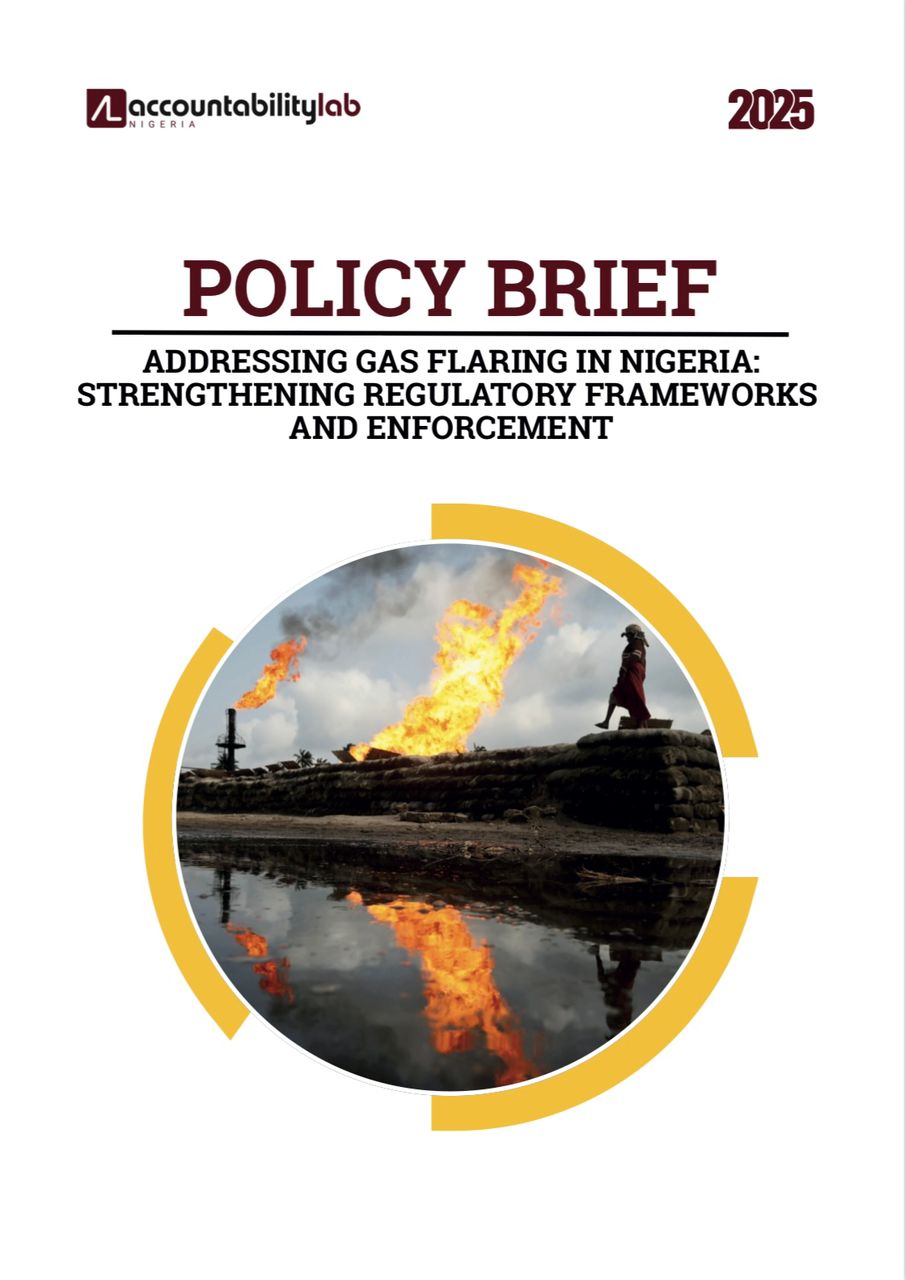NEWS
June 26, 2025

IN BRIEF
Accountability Lab Nigeria is pleased to announce the launch of a new policy brief on “Addressing Gas Flaring in Nigeria: Strengthening Regulatory Frameworks and Enforcement.” This timely publication examines the persistent issue of gas flaring in Nigeria and provides actionable recommendations to strengthen regulatory enforcement, improve inter-agency coordination, and reduce the social, environmental, and economic costs of flaring. Despite the enactment of the Petroleum Industry Act (PIA) in 2021, Nigeria remains the world’s seventh-largest gas flare, releasing approximately 7 billion cubic [...]
SHARE
Accountability Lab Nigeria is pleased to announce the launch of a new policy brief on “Addressing Gas Flaring in Nigeria: Strengthening Regulatory Frameworks and Enforcement.” This timely publication examines the persistent issue of gas flaring in Nigeria and provides actionable recommendations to strengthen regulatory enforcement, improve inter-agency coordination, and reduce the social, environmental, and economic costs of flaring.
Despite the enactment of the Petroleum Industry Act (PIA) in 2021, Nigeria remains the world’s seventh-largest gas flare, releasing approximately 7 billion cubic meters (bcm) of gas annually. This not only results in severe environmental degradation and health challenges for host communities, but also leads to an estimated economic loss of $2.5 billion every year in wasted resources. Nigeria Extractive Industries Transparency Initiative (NEITI) also revealed that Nigeria flared 183.4 billion Standard Cubic Feet (5.2 billion m³) in 2023, valued at $458.5 million. This points to sustained high flaring levels. According to another report by HumAngle, a hospital physician in Obrikom noted an increased risk of tumors among residents in proximity to flares. Similarly, in Obrikom and Egbema, community hospitals reported 1,345 and 2,124 respiratory-related cases (coughing, wheezing, shortness of breath) from 2013–2023, directly associated with gas-flaring pollution. Air pollution levels from flaring exceed WHO safety guidelines, leading to significantly higher rates of respiratory conditions, especially in children.
The policy brief examines the roles of the Nigerian Upstream Petroleum Regulatory Commission (NUPRC) and the Nigerian Midstream and Downstream Petroleum Regulatory Authority (NMDPRA), both created under the PIA. It highlights key challenges such as weak penalties for gas flaring, poor enforcement, lack of real-time monitoring tools, and overlapping responsibilities between the two agencies. These issues have made it difficult to effectively tackle gas flaring. The brief also points out gaps in regulation and offers practical recommendations to help Nigeria improve its approach, align with global best practices, protect the environment, and recover lost economic value. It draws on examples from other countries and provides a roadmap for stronger gas flare governance through clearer mandates, improved data systems, and stronger penalties.
Effective governance in Nigeria remains a key factor that ensures the successful implementation of existing laws and regulations in the oil and gas sector. In line with the recommendations outlined in the policy brief, we strongly urge the government and regulatory agencies to:
- Increase gas flare penalties: The current fine of $2 per 1,000 scf is too low to discourage flaring. The National Assembly should urgently amend Section 104 of the PIA to raise penalties and make them more effective;
- Add health compensation to the PIA: The PIA mentions environmental cleanup but ignores the health impacts of gas flaring. The law should be amended to compensate people suffering from related illnesses like cancer, miscarriages, and respiratory diseases;
- Use satellite tech to track flaring: To track gas flaring accurately and independently, Nigeria should adopt satellite monitoring systems, just as other countries in the global gas flaring reduction projects have done;
- Publish flare penalty payments: A public dashboard should be created to show how much gas was flared, what fines were paid, by which companies, and who was exempted, making the process transparent;
- Strengthen coordination between regulators: NUPRC and NMDPRA should form a joint task force to work together on reducing flaring across the entire gas value chain, from production to usage;
- Speed up gas utilization projects: The government should fast-track the use of flared gas for power, industry, and export. Gas processing plants should also be built in high-flaring areas for local use;
- Engage communities and provide remedies: Communities affected by gas flaring should be involved in monitoring and have access to compensation and justice for the harm caused.
As part of our ongoing commitment to making natural resource governance work for Niger-delta communities, we invite policymakers, civil society organizations, the media, and the public to engage with the findings and collaborate on practical solutions to end gas flaring in Nigeria.
To access the full policy brief, please visit our website.
Signed
Blessing Anolaba
Storytelling Development Officer
